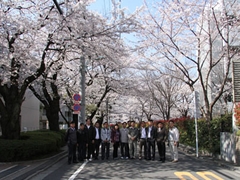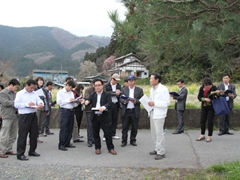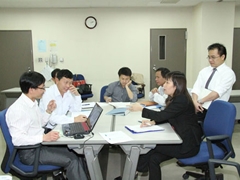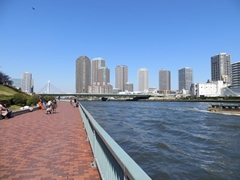- Home
- Technical Cooperation Projects
- Index of Countries
- Asia
- Viet Nam
- Project for Sustainable Forest Management in the Northwest Watershed Area (SUSFORM-NOW)
- Project News
- Study tour to Japan on rural development organized
Project News
2012-05-15
Study tour to Japan on rural development organized
(By Ha Luong Hong, Dien Bien Sub-Department of Forestry)
 The participants with blooming sakura trees in front of TIC.
The participants with blooming sakura trees in front of TIC.
In implementing a cooperative agreement signed between JICA and the Dien Bien Province People’s Committee, in April, the Project for Sustainable Forest Management in the Northwest Watershed Area (SUSFORM-NOW) and the Department of Agriculture and Rural Development (DARD) of Dien Bien Province has organized a study tour to Japan to exchange and learn experiences in rural development. The study tour was held from 4 to 27 April 2012, involving 12 officers from DARD, People’s Committees of Dien Bien District, Dien Bien Dong District, Dien Bien Phu City, and four communes where the project pilot activities were underway.
The study tour participants arrived at the Narita Airport in the morning on 5 April 2012. The first thing came to the mind of the participants was the feeling of peacefulness, cleanliness, and automation. It was the time for sakura flower – the participants found sakura trees with beautiful pure white flowers on many streets and parks on the way from the Narita Airport to the Tokyo International Centre (TIC) where we stayed during the four-week study tour. TIC is the biggest training center of JICA. There are thousands of people from many countries visiting TIC for study and research annually.
During the training course, the participants had many opportunities to interact with Japanese experts who had very good experience in project planning and implementation in Japan and other countries. Through our discussion, we learned the process of formation and development of agriculture in the mountainous areas in Japan, approaches and practices for life improvement and environmental protection, and leadership capacity building for farmers' organizations. We also visited the mountainous villages and some livelihoods models such as a sake (Japanese rice wine) processing company, a tofu factory, a biogas plant, Otome Kai (an agricultural food processing group), a road-side station (michi no eki), and others.
 Practicing a village survey in Nakakasuo, Kanuma City, Tochigi Prefecture.
Practicing a village survey in Nakakasuo, Kanuma City, Tochigi Prefecture.
 Group discussion and analysis.
Group discussion and analysis.
Japanese experts provided us with methods for recognizing and analyzing problems as well as formulating solutions in order to promote livelihoods development and life improvement. These methods were useful for promoting sustainable forest management in Dien Bien Province. We were also given opportunities to apply these methods in the training. We started with a practice field survey to collect socio-economic information from local people in order to identify local needs, their capacities, and their conditions. We also practiced the formulation of livelihoods development and life improvement plans for a village. Unlike in Vietnam, ideas for village livelihoods development and life improvement in Japan were not imposed by administrative organizations. Instead, these plans were formulated after careful consideration of actual local conditions and potentials (such as natural condition, human resources, and market demand). Moreover, these plans were prepared and implemented by local people. Local governments and social organizations were supporters and facilitators in the planning and implementation processes. This approach produced very good results not only because the plans were suited for local conditions, needs, and capacities, but also because the local people were responsible for implementation. All participants appreciated the learning because the lessons were highly applicable to the development planning and implementation in Dien Bien Province.
 Sumida River of Tokyo.
Sumida River of Tokyo.
Besides classes and interesting field trips, we were able to visit a number of historical and cultural places in Tokyo on weekends under the guidance of Japanese experts. Although we had learned about Tokyo and its people through TV, internet, and media, what we had seen there were above our imagination. Twenty-two days of our study tour in Japan was a short period of time, but we have gained good knowledge and experience on livelihoods development and life improvement for people living in the mountainous area as well as environmental protection. We could also enhance our knowledge on the people and culture of Japan.
- About JICA
- News & Features
- Countries & Regions
- Our Work
- Thematic Issues
- Types of Assistance
- Partnerships with Other Development Partners
- Climate Change / Environmental and Social Considerations
- Evaluations
- Compliance and Anti-corruption
- Science and Technology Cooperation on Global Issues
- Research
- JICA Development Studies Program / JICA Chair
- Support for the Acceptance of Foreign HRs / Multicultural and Inclusive Community
- Publications
- Investor Relations
